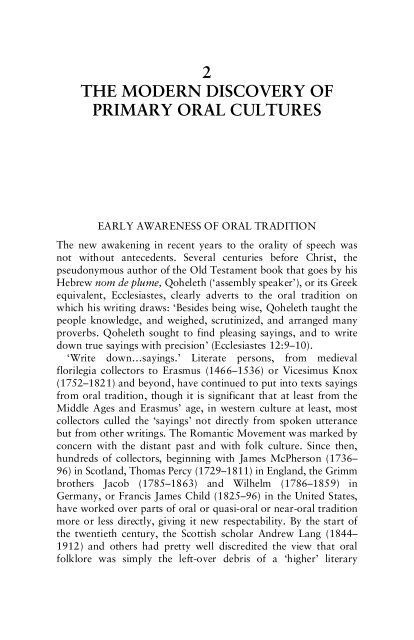Orality and Literacy: The Technologizing of the Word - Monoskop
Orality and Literacy: The Technologizing of the Word - Monoskop
Orality and Literacy: The Technologizing of the Word - Monoskop
Create successful ePaper yourself
Turn your PDF publications into a flip-book with our unique Google optimized e-Paper software.
2<br />
THE MODERN DISCOVERY OF<br />
PRIMARY ORAL CULTURES<br />
EARLY AWARENESS OF ORAL TRADITION<br />
<strong>The</strong> new awakening in recent years to <strong>the</strong> orality <strong>of</strong> speech was<br />
not without antecedents. Several centuries before Christ, <strong>the</strong><br />
pseudonymous author <strong>of</strong> <strong>the</strong> Old Testament book that goes by his<br />
Hebrew nom de plume, Qoheleth (‘assembly speaker’), or its Greek<br />
equivalent, Ecclesiastes, clearly adverts to <strong>the</strong> oral tradition on<br />
which his writing draws: ‘Besides being wise, Qoheleth taught <strong>the</strong><br />
people knowledge, <strong>and</strong> weighed, scrutinized, <strong>and</strong> arranged many<br />
proverbs. Qoheleth sought to find pleasing sayings, <strong>and</strong> to write<br />
down true sayings with precision’ (Ecclesiastes 12:9–10).<br />
‘Write down…sayings.’ Literate persons, from medieval<br />
florilegia collectors to Erasmus (1466–1536) or Vicesimus Knox<br />
(1752–1821) <strong>and</strong> beyond, have continued to put into texts sayings<br />
from oral tradition, though it is significant that at least from <strong>the</strong><br />
Middle Ages <strong>and</strong> Erasmus’ age, in western culture at least, most<br />
collectors culled <strong>the</strong> ‘sayings’ not directly from spoken utterance<br />
but from o<strong>the</strong>r writings. <strong>The</strong> Romantic Movement was marked by<br />
concern with <strong>the</strong> distant past <strong>and</strong> with folk culture. Since <strong>the</strong>n,<br />
hundreds <strong>of</strong> collectors, beginning with James McPherson (1736–<br />
96) in Scotl<strong>and</strong>, Thomas Percy (1729–1811) in Engl<strong>and</strong>, <strong>the</strong> Grimm<br />
bro<strong>the</strong>rs Jacob (1785–1863) <strong>and</strong> Wilhelm (1786–1859) in<br />
Germany, or Francis James Child (1825–96) in <strong>the</strong> United States,<br />
have worked over parts <strong>of</strong> oral or quasi-oral or near-oral tradition<br />
more or less directly, giving it new respectability. By <strong>the</strong> start <strong>of</strong><br />
<strong>the</strong> twentieth century, <strong>the</strong> Scottish scholar Andrew Lang (1844–<br />
1912) <strong>and</strong> o<strong>the</strong>rs had pretty well discredited <strong>the</strong> view that oral<br />
folklore was simply <strong>the</strong> left-over debris <strong>of</strong> a ‘higher’ literary

















